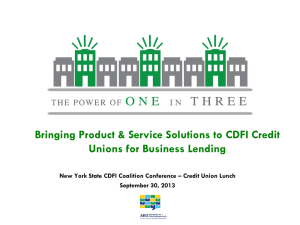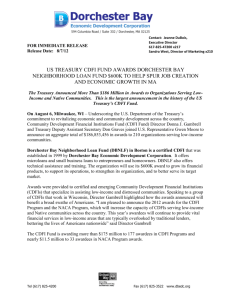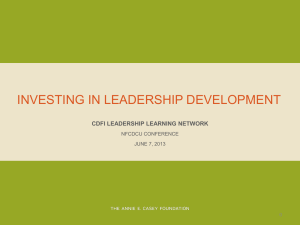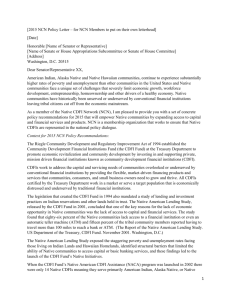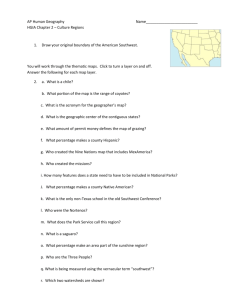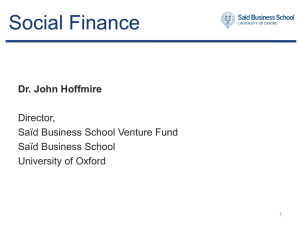First Southwest Bank
advertisement
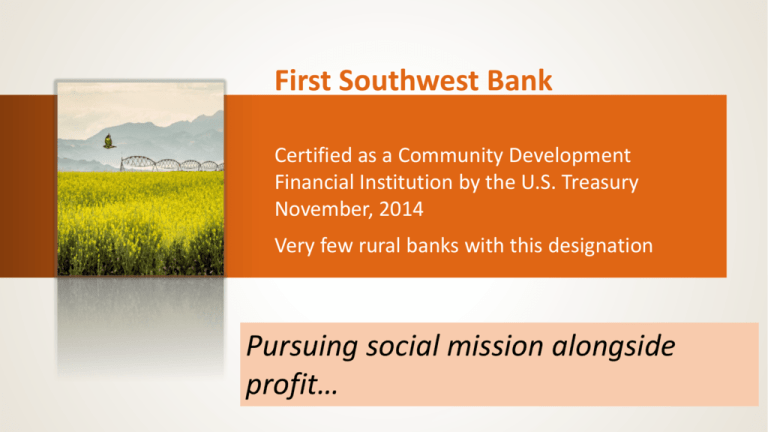
Certified as a Community Development Financial Institution by the U.S. Treasury November, 2014 Very few rural banks with this designation Pursuing social mission alongside profit… Requirements to be a CDFI • • • • • • Have a primary mission of promoting community development; Predominantly serve and maintain accountability to eligible target markets; Be a financing entity; Provide development services; Over 60% of lending must be in a Low-Income Census Tract; Neither a government entity nor controlled by a government entity. CDFI Initiatives Through our CDFI initiatives, FSWB will work in the following areas: • Business Development • Education and Early Child Care • Affordable Housing • Healthy Food • Sustainable Energy • Community Infrastructure • Financial Literacy What have we done in the first 200 days as a CDFI? Funding Applications Financial Assistance Award (FA) • Use: FA funds may be used for financing capital, loan loss reserves, capital reserves or operations/developmental services. FA funds must be matched by FSWB. • Request: $2 million, award will be at a rate of 2.5% for 13 years. • Dates: Submitted November 2014, notification expected Sept/Oct 2015. USDA Intermediary Relending Program (IRP) • Use: The purpose of the IRP program is “to alleviate poverty and increase economic activity and employment in rural communities.” • Request: $1 million, award will be at a rate of 1% fixed for 30 years. • Dates: Submitted March 2015, notification expected in Aug/Sept 2015. Federal Home Loan Bank, Joint Opportunities for Building Success (JOBS) • Use: Submitted on behalf of Pagosa Springs Community Development Corporation. • Request: $25,000, award will be a grant. • Dates: Submitted April 2015, with Region 9, and Southwest SBDC, Pagosa Chamber of Commerce, Town of Pagosa Springs and Archuleta County. Notification expected July 2015. Upcoming Applications Bank Enterprise Awards (BEA) • Use: This program provides formula-based grants for CDFI-related activities: equity investments, equity-like loans, grants, loans, deposits/shares and technical assistance to CDFI partners. • Request: FSWB will apply for “rebates” for the following activities in December 2014: 3 deposits of $250,000 in CDFI credit unions for $750,000 total; average yield at 1.08%; 3- year maturity. • Dates: Due June 15, 2015, notification expected Fall 2015. Expanding Our Reach and Meeting Needs The CDFI certification aligns with First Southwest's primary goal of community development and accountability in the San Luis Valley, Southwestern Colorado and beyond. The CDFI certification recognizes First Southwest Bank's work in market niches that currently are underserved by more traditional financial institutions. Serving the Four Corners Region Informational Meetings Senator Michael Bennett* (D – CO) Referrals to: • Colorado Advanced Industry Investment Tax Credits • Colorado Enterprise Fund / Innosphere Early Stage Loan Pool • SBA Small Business Investment Company loan program There is also great interest from Sen. Bennett in terms of how FSWB can serve constituents in communities where jobs are receding. Representative Scott Tipton** (R – CO, 3rd District) Suggestions for how regulatory changes will allow CDFI bond funds to be better utilized by banks were received positively. *Sen. Bennett is a member of the Senate committees on Finance; Health, Education, Labor and Pensions; and Agriculture, Nutrition and Forestry. **Rep. Tipton is a member of the House Financial Services committee and the subcommittee on Financial Institutions and Consumer Credit. First Southwest Community Fund A 501c3 entity, First Southwest Community Fund, is being created to leverage private and public resources. Founded under the IRS tax exempt criteria of “Education” and “Charitable Purposes” …to alleviate poverty and fight community deterioration. See: Southern Bancorp Community Partners, the 501c3 arm of Southern Bancorp http://southernpartners.org/. CRC – Rural Philanthropy Days • The Community Resource Center (CRC – Denver) supports all Colorado nonprofits with training, education and networking to bring funders and grant seekers together. • Rural Philanthropy Days will be held in Creede in September 2015. FSWB will be involved at Rural Philanthropy Days in a substantive way. • FSWB staff participated with leading Colorado foundations in a three-day “listening tour” in the counties comprising the San Luis Valley, learning about pressing community needs and hearing how the large Colorado funders are addressing these challenges. Programs to consider supporting in 2015-16 VITA: Volunteer Income Tax Assistance – This program helps low-income individuals and seniors prepare their taxes. Montezuma Farm to School – Started three school garden programs and production areas run by professional coordinators, expanded field trips, farmers markets and summer farm camps. Serves over 1600 children with integrated school curricula that incorporates nutrition, healthy lifestyle, soil and water conservation, history and other core content. National Young Farmers Coalition – Supports practices and policies that will sustain young, independent and prosperous farmers. They are specifically addressing access to land in Southwest Colorado. Alamosa Healthy Habits – Provides fruit and vegetable vouchers for low-income families and cooking demonstrations at farmers markets. Financial Literacy – Educational programs for K-12 and college students. Partnerships and Collaborations Young Americans Center for Financial Education This Denver based organization is seeking support for an “on-the-road” version of their successful, long standing “AmeriTowne” program which teaches 5th graders about the American Enterprise system. Regional Housing Alliance (RHA) of LaPlata County FSWB can become a lending source of this organization; the BEA Treasury Program offers incentives for CDFI Banks to support CDFI Loan Funds. FSWB is also pursuing housing alliances in the San Luis Valley. Advocacy and Learning Community Development Bankers Association Our CEO has joined the Education Committee of CDBA, the advocacy group in Washington for community development banks. This role will provide FSWB with insights into how other CDFIs create and manage programs such as: small dollar loans, socially responsible deposits, and other innovative services. Pipeline Loan Projects First Southwest Bank is becoming known as the “bank that gets things done,” the “go-to” bank for learning about what CDFI may provide. Current projects that may have CDFI components: • Cortez Historic Building: Purchasers are looking into New Market Tax Credits, as well as additional grants to restore the historic building in Cortez. • Medical Supply Company: This company provides medical field kits for the military and is a Veteran-owned business. They hire some employees with disabilities and could expand this number. • Recycling Company: Expansion for this company will be supported by a USDA loan component, and may benefit from additional USDA IRP funds to help with an equipment purchase. Funding resources to support recycling or employment of disabled workers may be appropriate. • Child Care Company: A start-up company in Pagosa is working to develop a network of home-based child care providers in Southwest Colorado. Early child care has been identified as a critical need in the region. Broadband According to the FCC, of the 19 million Americans without access to Broadband, 14.5 million live in rural areas. First Southwest is committed to lessening the digital divide. As a CDFI, First Southwest can leverage both private and public funds to work to bring broadband to rural communities. How is our work as a CDFI affected by broadband access? Business Development • Businesses can be headquartered in rural locations but still have access to global and niche markets. • Individuals living in rural locations can still further their career through job training courses and accreditation programs, online applications, and networking sites. How is our work as a CDFI affected by broadband access? Education and Early Child Care • Allows access to courses, such as languages and technology classes not offered in rural communities. • Provides resources, such as additional tutoring, that smaller communities may not have the infrastructure and personnel for. • Provides additional tools to accommodate those with learning disabilities that smaller communities may not be able to address. • Online courses allow individuals to earn college credit remotely while working full time. • Allows individuals to train for technical careers in areas outside of their community. How is our work as a CDFI affected by broadband access? Affordable Housing • The internet provides crucial information about affordable housing units and various government programs to assist those in need. Healthy Foods • Individuals can learn what foods are in season, local and organic. • Information to recipes and ideas about how to eat and cook healthier. Sustainable Energy • Many rural areas still lack electricity. Optic fibers can be included in modern power distribution networks, introducing both electricity and internet to rural areas. How is our work as a CDFI affected by broadband access? Community Infrastructure • Through telemedicine, citizens have access to doctors and specialists outside of their geographic area. • Virtual appointments and consultations save on travelling time and costs, preventing workers from taking more time off work. Financial Literacy • Financial literacy courses encouraging smarter money management are often offered online. As a CDFI, First Southwest Bank is dedicated to serving the residents and businesses of Southwest Colorado that historically lack access to financial services or do not currently participate in the mainstream economy. To learn more, contact: Kent Curtis, CEO kent.curtis@fswb.com Photos by Jeff Laydon, Pagosa Photography
